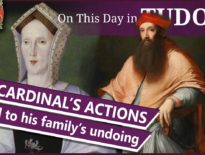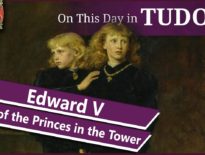On this day in Tudor history, 3rd November 1534, Parliament passed the First Act of Supremacy, establishing King Henry VIII's supremacy of the English church and rejecting the authority of the pope.
In today's talk, I share what the act said and explains that it didn't actually make him head of the church, just confirmed the fact, and go on to share the oath that people had to take and what it meant if they refused.
It was an important act in the break with Rome and the English Reformation.
Also on this day in Tudor history, 3rd November 1592, in the reign of Queen Elizabeth I, privy councillor and former Lord Deputy of Ireland, Sir John Perrot, died at the Tower of London. Perrot is a fascinating Tudor man who survived being a Protestant and protecting 'heretics' in Mary I's reign, and who was saved six times from serious punishment by Queen Elizabeth I's intercession. Some people believe that this favour, and a few other factors, point to him being King Henry VIII's illegitimate son. You can find out more about Perrot and the arguments for and against him being Henry VIII's son, in last year’s video:
Also on this day in history:
- 1568 – Death of Nicholas Carr, physician, classical scholar and Regius professor of Greek at Cambridge. He was laid to rest in St Michael's Church, Cambridge, and a monument was erected in his memory at St Giles's Church. His works included De Scriptorum Britannicorum Paucitate et Studiorum Impedimentis Oratio, Epistola de morte Buceri ad Johannem Checum, Eusebii Pamphili de vita Constantini and Demosthenis Graecorum Oratorum Principis Olynthiacae orationes tres, et Philippicae quatuor, e Greco in Latinum conversae.
Transcript:
On this day in Tudor history, 3rd November 1534, Parliament passed the First Act of Supremacy.
What did this mean?
Well, this act confirmed the status of King Henry VIII, and his successors, as the supreme head of the church in England and made it treasonable to support the authority of the pope in England.
Here is the wording of the act from the Statutes of the Realm:
“Albeit, the King's Majesty justly and rightfully is and oweth to be the supreme head of the Church of England, and so is recognised by the clergy of this realm in their Convocations; yet nevertheless for corroboration and confirmation thereof, and for increase of virtue in Christ's religion within this realm of England, and to repress and extirp all errors, heresies and other enormities and abuses heretofore used in the same, Be it enacted by authority of this present Parliament that the King our sovereign lord, his heirs and successors kings of this realm, shall be taken, accepted and reputed the only supreme head in earth of the Church of England called Anglicana Ecclesia, and shall have and enjoy annexed and united to the imperial crown of this realm as well the title and style thereof, as all honours, dignities, preeminences, jurisdictions, privileges, authorities, immunities, profits and commodities, to the said dignity of supreme head of the same Church belonging and appertaining. And that our said sovereign lord, his heirs and successors kings of this realm, shall have full power and authority from time to time to visit, repress, redress, reform, order, correct, restrain and amend all such errors, heresies, abuses, offences, contempts and enormities, whatsoever they be, which by any manner spiritual authority or jurisdiction ought or may lawfully be reformed, repressed, ordered, redressed corrected, restrained or amended, most to the pleasure of Almighty God, the increase of virtue in Christ's religion, and for the conservation of the peace, unity and tranquillity of this realm: any usage, custom, foreign laws, foreign authority, prescription or any other thing or things to the contrary hereof notwithstanding.”
Notice from the wording that Parliament wasn’t making the king supreme head, it was recognising that the king was “justly and rightfully” supreme head, so it was stating that it was an established fact.
This act of Parliament paved the way for English Reformation and the subsequent dissolution of the monasteries. The king was now the highest authority in the land, under God, and support for the papacy or the authority of the pope was deemed treason.
On 15th January 1535, in front of his privy chamber, Henry VIII proclaimed that he was now Supreme Head of the Church of England, and the act came into force in February 1535.
Any person taking public or church office in England was required, as part of the legislation, to swear the Oath of Supremacy, thus recognising Henry VIII as supreme head. The text of the oath read:
“I (name) do utterly testifie and declare in my Conscience, that the Kings Highnesse is the onely Supreame Governour of this Realme, and all other his Highnesse Dominions and Countries, as well in all Spirituall or Ecclesiasticall things or causes, as Temporall: And that no forraine Prince, Person, Prelate, State or Potentate, hath or ought to have any Jurisdiction, Power, Superiorities, Preeminence or Authority Ecclesiasticall or Spirituall within this Realme. And therefore, I do utterly renounce and forsake all Jurisdictions, Powers, Superiorities, or Authorities; and do promise that from henchforth I shall beare faith and true Allegiance to the Kings Highnesse, his Heires and lawfull Successors: and to my power shall assist and defend all Jurisdictions, Privileges, Preheminences and Authorities granted or belonging to the Kings Highnesse, his Heires and Successors or united and annexed to the Imperial Crowne of the Realme: so helpe me God: and by the Contents of this Booke.”
The Treason Act of 1534 made it treason to disavow the Act of Supremacy, the punishment being death.
Famous examples of those who refused to recognise the king’s supremacy include the Carthusian monks of London Charterhouse and the king’s former Lord Chancellor, Sir Thomas More.
Trivia: It was George Boleyn, Anne Boleyn’s brother, who’d been sent to convocation in 1531 to put forward the arguments for the king’s supremacy. Although convocation balked at the idea initially, they recognised the king as supreme head “as far as the law of Christ allows”. Then, the Reformation Parliament as it is known cemented this in 1534.



Wow, you would need a canon law degree to even understand it, let alone know what you were swearing to. Thomas More understood it all too well. “This oath is like a two edged sword for if a man swears one way he may lose his life, but if he swears another, he will lose his soul.”
The monks of course had the education to know the words true meaning. Henry was setting himself up with the same authority granted by Christ to the descendants of Saint Peter in England and taking on all of the rights and privileges of that title that had evolved in the 1500 years previously. All of the Church taxes and exemptions were transferred to the treasury as well. No English King had ever had so much power. No wonder they were reluctant to sign these oaths. Allegiance to the King was one thing, giving him power reserved for the Church was simply not on. Several faithful friends and servants, including More and Fisher and a number of the holy Friars who were known personally to Cromwell and King Henry died because of their conscience. Henry’s power and his paranoia are bound up together I believe and led him down a dangerous path.